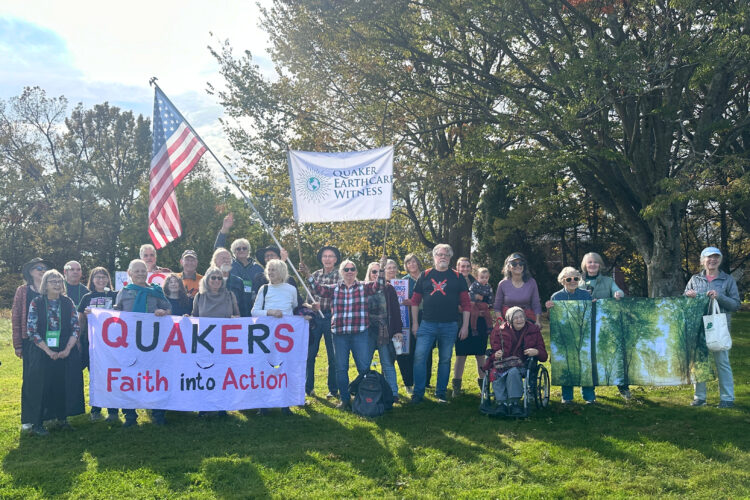Talking about Climate Change: A Practical Guide

This article is part of our Pamphlets for Sharing series produced by QEW’s Publications Committee. Download the PDF here or order print copies by emailing info@quakerearthcare.org.
The way we communicate our message is critical so that the vast majority of people not only grasp what we are trying to convey but also appreciate how the message that we are presenting connects with their lives.— Dr. Antonio Flores of Eco-America (1)
In December of 2015, all but two countries on Earth (194 countries) signed the Paris agreement to hold the temperature increase to well below 2oC, to adapt in a manner that does not threaten food production, and to make finance availability consistent with a pathway towards low greenhouse gas emissions and climate-resilient development. By October 4, 2016, enough countries had ratified the agreement to bring it into force. (2)
Prior to 2010 Republican politicians acknowledged the threat of climate change, including George W. Bush, who openly explained his administration’s approach to addressing climate change. (3) But since the Citizens United decision the large amounts of “dark” money injected into political campaigns have led some public officials to deny the current and future effects of climate change. Gallup polls indicate that in 2017 only 45 percent of Americans are worried about climate change (up from 37 a year ago). (4)
This pamphlet will serve as a practical guide not so much to persuade as to help us find effective ways to talk about climate change, increase public awareness, and counter the political pressure of that “dark money.”
Some studies of various approaches to talking about climate change offer general advice:
- Avoid alarmist language and dire future predictions.
- Approach climate change as an economic or public health issue rather than an environmental disaster. (5)
- Depict climate change as a collective rather than an individual problem. (6)
- When discussing with conservatives, avoid talking about the potential future effects of climate change. Instead focus on past glories as a positive standard that is disappearing in the present, mostly due to climate change. One could describe the abundant forests, clean lakes and rivers of the past. The obvious comparison with the present makes the case for climate change. Presenting climate change as a dire prediction of the future proved much less effective with conservatives. For example, saying that there was less traffic in the past was more effective than predicting more traffic in the future. (7)
Two organizations in particular provide a great deal of practical assistance in talking about climate change.
Eco-America’s Blessed Tomorrow Program “works with religious and denominational leaders from across a diversity of traditions to care for creation and elevate their leadership on climate change as a moral, religious, and justice issue.” Their website provides scriptural references and talking points to help faith leaders “engage all congregations … and accelerate collective action.” (8)
Greenfaith’s Climate Outreach Program, has “over ten years of experience helping [their] partners to talk and think about climate change.” They have developed guidelines for talking with people from five major faiths. Based on that experience, Greenfaith describes five narratives that work across faiths: (9)
- Earth is a precious gift with which we have been entrusted. Climate change is harming Earth. We need to return to our appropriate relationship with Earth.
- Climate change is a moral challenge, harming the poor and vulnerable, including all creatures of Earth. We have a moral obligation to practice non-violence and do no harm to others.
- Climate change is disrupting the natural balance. Tipping the natural order off balance leads to instability and chaos.
- We live our faith through our actions. We ought to live more simply so as not to negatively impact the climate.
- I take a personal pledge to share, lead, and teach because I have a responsibility for the harm I may have caused. I will right this wrong and help to inspire others.
Greenfaith also has some general advice:
- Avoid overstressing disaster.
- Avoid disengaging from climate change by viewing it as an issue affecting other people in other places. Avoid arguments that inaction is wrong or evil.
- Avoid blame or any sense of climate change as personal failure.
- Be careful when discussing causality. Faith groups hold different attitudes about God’s role in creating or restoring balance.
Consider word choices and avoid “trigger” terms:
- Justice (substitute Fairness)
- Punishment
- Disobedience
- Natural Limits
- Signs and Tests (substitute Warning)
- Proselytizing
- Religion
- Forgiveness
- Civilization and Prosperity
What Can Friends Do?
- Climate change is accelerating. We need to act now, with urgency.
- Clean Energy must be scaled up, involving both private and public sectors.
- We can use the infrastructure crisis as an opportunity to make climate-smart decisions.
- Land use is a major emissions source, so be alert to land use changes.
- Lobby for more and better coverage of climate change by the public media.
- Patronize businesses that work to address climate change within their operations.
- Learn to speak with others in effective ways.
Climate change denial may arise, not from ignorance or self-interest, but from the sense that nothing we do, as seemingly insignificant individuals, can make a real difference. This form of denial arises from feeling overwhelmed by the immensity of the problems. This existential quandary is not intellectual, not from a lack of information, but rather comes from data overload. The help needed here is not a list of things to do, not more ideas, not more information, but human compassion, understanding and connection.
The simplest and most profound gift in this situation is the gift of attention. Those in the mental health professions and other related fields have substantiated the benefits of active, careful, authentic listening. As Friends we are well acquainted with honest caring queries. We are comfortable with silence and attention to spirit. We can employ these spiritual skills here.
When silent spiritual space is offered to stressed individuals, often they will open their hearts and share what troubles them. After people feel certain they are not being judged, or forced to feel more guilty than they already do, they have the opportunity to explore the fears that are immobilizing them. Released of their inhibitors to action, people can more easily take their own small steps towards action. Simple actions may be self-assuring, especially as people find themselves on the same path to well-being as are others who are also struggling with needed changes. Always, it is not the action but the compassion that is our intention.
In QEW we seek ways to unite in environmental action even as our views differ. We focus on listening with an open heart, and then responding as led in our own terms to the heart of the message, trusting that the others will do the same. If environmental groups are diverse and inclusive, the environmental movement can speak for the world in which we all live and may serve as an example of cooperation.
Endnotes
1) Eco-America 2017 Impact Report.
2) European Commission 4 October 2016. Paris Agreement to enter into force as EU agrees ratification.
3) Bush, George W., 2001.
4) Saad, Lydia, 2017. Global Warming Concern at Decade High in U.S.
5) Swanker, Gwen, 2016. Reframe Climate Change as a Complex Issue.
6) Kinckley, Story, 2016. Is There a Right Way to Talk about Climate Change?.
7) Cimmons, Marlene, 2016. Have We Been Talking about Climate Change All Wrong? Nexus Media, December 13, 2016.
8) Eco-America, 2016.
9) Marshall, G., Corner, A., Roberts, O. and Clarke, J., 2016. Faith & Climate Change: A Guide to Talking with the Five Major Faiths.

